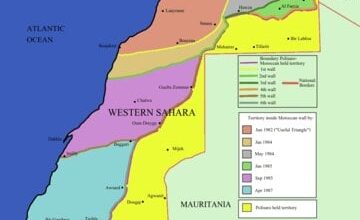War catastrophes and hunger devour children in Sudan by Ismail Hagana
Translated from Arabic by Ibrahim Ebeid, March 5, 2024

War catastrophes and hunger devour children in Sudan.
Ismail Hagana
(Strategic Advisor for Humanitarian and Development Affairs)
March 14, 2024
It’s no secret that the catastrophic situation in Sudan is on the minds of many of you these days. Here, we are talking about a reality that takes work. Just imagine a moment: the United Nations World Food Programme (WFP) sends an urgent distress appeal to the parties to the conflict in Sudan. One simple thing, but strictly and explicitly, they ask for guarantees for the safe delivery of food aid to conflict-affected areas, especially to those trapped behind conflict lines, cut off from the world, and struggling with hunger. in Khartoum, Darfur, Kordofan and Jazira.
Let’s get to the heart of the matter. Sudan is now in a truly tragic situation and has become a model for a failed state. Despite WFP’s ongoing efforts to deliver humanitarian aid to those in need, it is often met with systematic obstacles impeding the delivery of food aid to millions across the country since the outbreak of war, with some 18 million people at risk of acute hunger, alarm, and another catastrophe.
Imagine, the number in need of food has doubled shockingly compared to last year, and some five million people suffering from dangerous levels of hunger due to conflict, isolated from the world, are dying slowly and in terrifying silence. “Shockingly, the number of hungry people has more than doubled from last year,” the WFP said, and an estimated five million people are suffering from emergency levels of acute hunger (IPC Phase 4) due to conflict in areas such as Khartoum, Darfur, and Kordofan. At the heart of this crisis, iT has been working as the backbone of the humanitarian response, helping more than 6.5 million people. But the bitter truth is that he cannot currently deliver aid to only one in ten people in dire need of food and at risk of starvation.
At a session organized by the US Institute of Peace in Washington, D.C., the Director of US Aid and former US Ambassador to the United Nations, Samantha Power, described the conflict in Sudan as catastrophic, saying that millions of Sudanese live in terror, fearing for their lives and the lives of their loved ones. At the same time, more than 25 million people need essential assistance. Omaima Omar, coordinator of the Jebel Awliya Emergency Committees, said there are many difficulties facing the work of young volunteers, foremost among them the lack of security, lack of resources, and the interruption of transportation networks, which makes them travel distances with their legs to distribute food as well as help children during the closure of schools due to the war. Madamik Newspaper, February 2, 2024.
“The situation in Sudan today is catastrophic in every sense of the word, says Eddie Rowe, WFP Representative and Director in Sudan. ” Obstacles are piling up, from security threats to checkpoints and requests for fees and taxes, all hindering aid access.” Imagine, with me, the magnitude of the abysmal situation that things have reached in my country, afflicted by the senseless war. A popular proverb throughout Sudan applies: “They came to help him in the grave of his father and poked the fountains.” Or as one of the displaced people said with sorrow in one of the displacement camps that were dismantled in Gedarif, and pain is not hidden. He was hiding tears from his children: Dale, do not have mercy and do not let the mercy of God descend; God suffices, and yes, the agent in you.”
Even more tragically, a vital humanitarian center with a stockpile of humanitarian aid in Gezira state was devoured by fighting, and a critical warehouse for the World Food Programme was looted. Now, as aid continues to flow in some areas, there is an urgent need for creative ways and mechanisms and a firm, moral, and ethical commitment to overcome these challenges.
So, what do I want to say here? I mean, I like to say what in the local language! This is not just a call to action but a cry to humanity. Parties to the conflict must stop fighting or allow aid organizations to function freely without restriction or threat and stop extortion. We need immediate action to ensure that aid reaches those who require it now, no matter where they are. To get families in Darfur, WFP has established a cross-border route from Chad, through which more than a million people have received food assistance. Other agencies have also used this route to provide much-needed support. Earlier, the World Health Organization and the United Nations Children’s Fund (UNICEF) said that “the number of families suffering from hunger (in Sudan) has almost doubled.” All this confirms beyond any doubt the dire situation of children, who constitute the most significant proportion of those devoured and suffering from hunger, having fled war and been imprisoned in the calamity of hunger. It is a catastrophe that gives birth to another.
A note :Translated from Arabic by Ibrahim Ebeid, March 5, 2024





